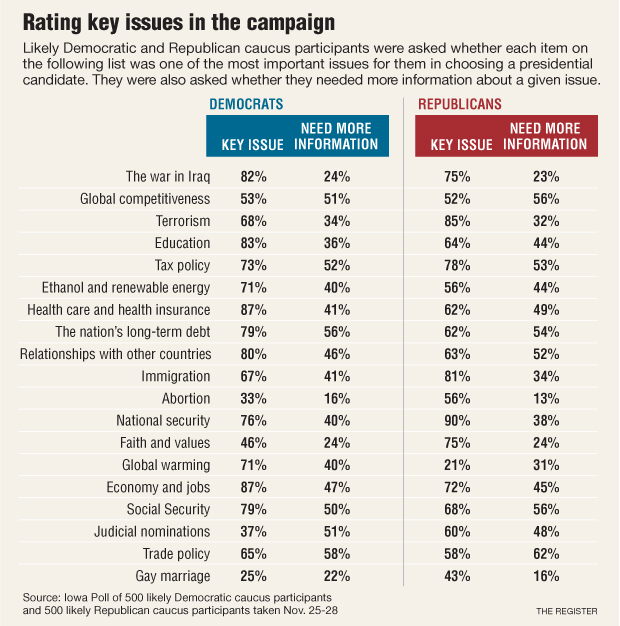Politics posts tend to fare poorly on N&B, but if people are desperate for procrastination, I want to suggest a new theory about Iowa & NH primaries. Here goes.
It has become very trendy to bash Iowa and NH for their central role in the primaries: They have too much influence on the nomination (see, e.g., what Iowa did for Kerry in 2004). They have poor judgment about the general election viability of the candidates (again, Kerry). They're not representative of the national Democratic electorate. Only a few thousand people vote or caucus. It's cold there, etc.
But is it possible that Iowa and New Hampshire aren't really disproportionately shaping the results of the race -- but simply ratifying the conclusions the rest of the country is slowly coming to?
Political reporters always assume the rest of the country is paying as much attention to politics as they are. But this isn't true at all. In fact, most of the country --
even Democratic primary voters -- could care less for 98% of the year.Survey after survey shows that voters don't pay attention at all until a few weeks out from the election. And so when pollsters come calling months ahead of time asking people who they're voting for, name ID and other handy mnemonics tend to decide the results. (Remember Joe Lieberman's "lock" on the 2004 nomination in early 2003?). But when voters
finally start to think about things, their opinions can change dramatically.
Iowa voters are starting to think about things. NH too. And so forth through the early primaries. With this in mind, take a look at this list of current polling in the first six major Democratic primaries or caucuses, in the order in which they go to the polls. The number represents Hillary's average lead over Obama, according to Slate's
Election Scorecard (and the
most recent NV poll, which Slate doesn't have).
Iowa: + 0.1%
New Hampshire: + 7.3%
Nevada: + 8%
South Carolina: +9.6%
Florida: + 30.9%
California: +32%
In other words, in perfect lock-step, the sooner the state is about to vote, the more Hilary's lead shrinks. The more the voters are thinking about the election -- filling out their sample ballots, meeting the candidates, seeing TV ads, watching debates, reading newspaper coverage -- the more they like Obama instead of Hillary.
This could be bad, bad news for Hillary -- even more so than the pundits are already talking about. It looks like the more the public sees of Senator Clinton, the less they like about her.
If Obama indeed wins the nomination, it might not necessarily be because of his last-minute surge in Iowa and New Hampshire. It might just be because when voters finally think about things, they're not so keen on the Senator from New York.
(PS -- I'm personally torn about all three major candidates (and I even like Biden a little too), but I figure I have winter break to worry about that.)
Labels: Elections

